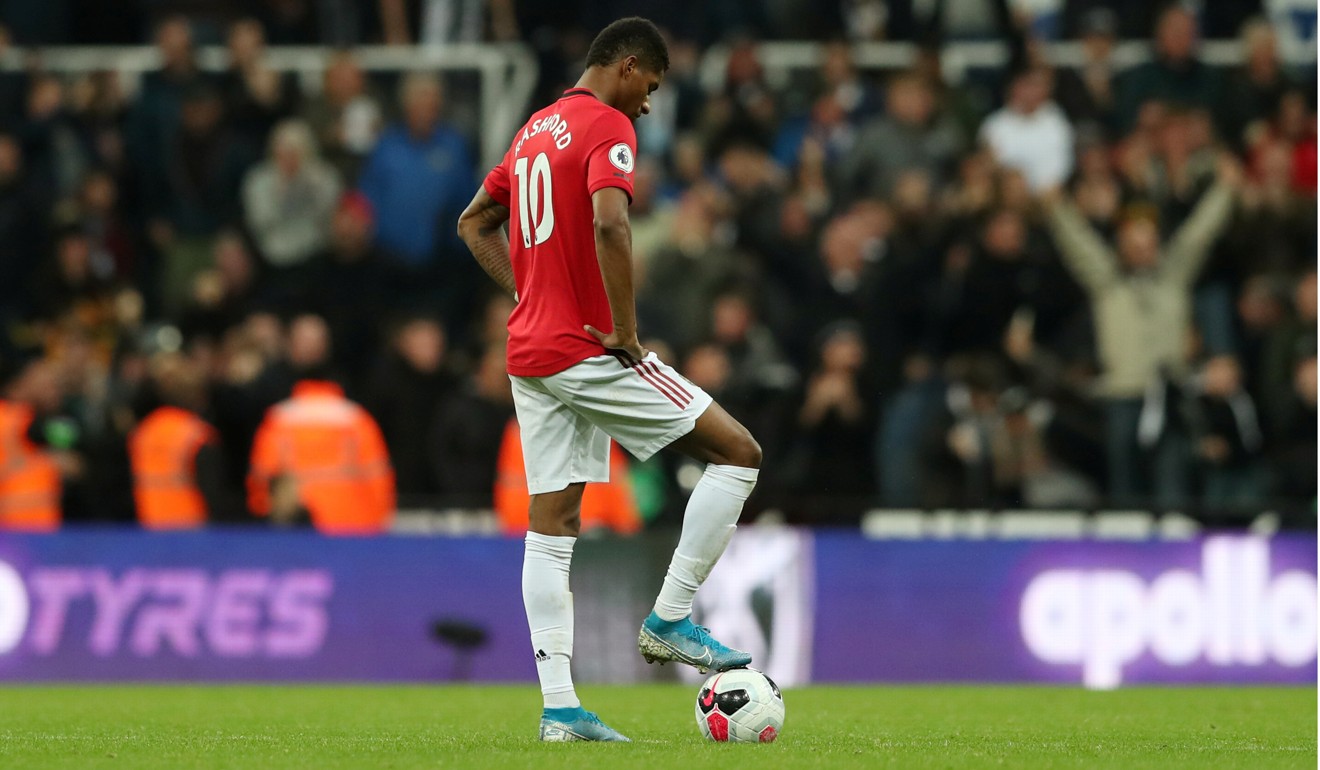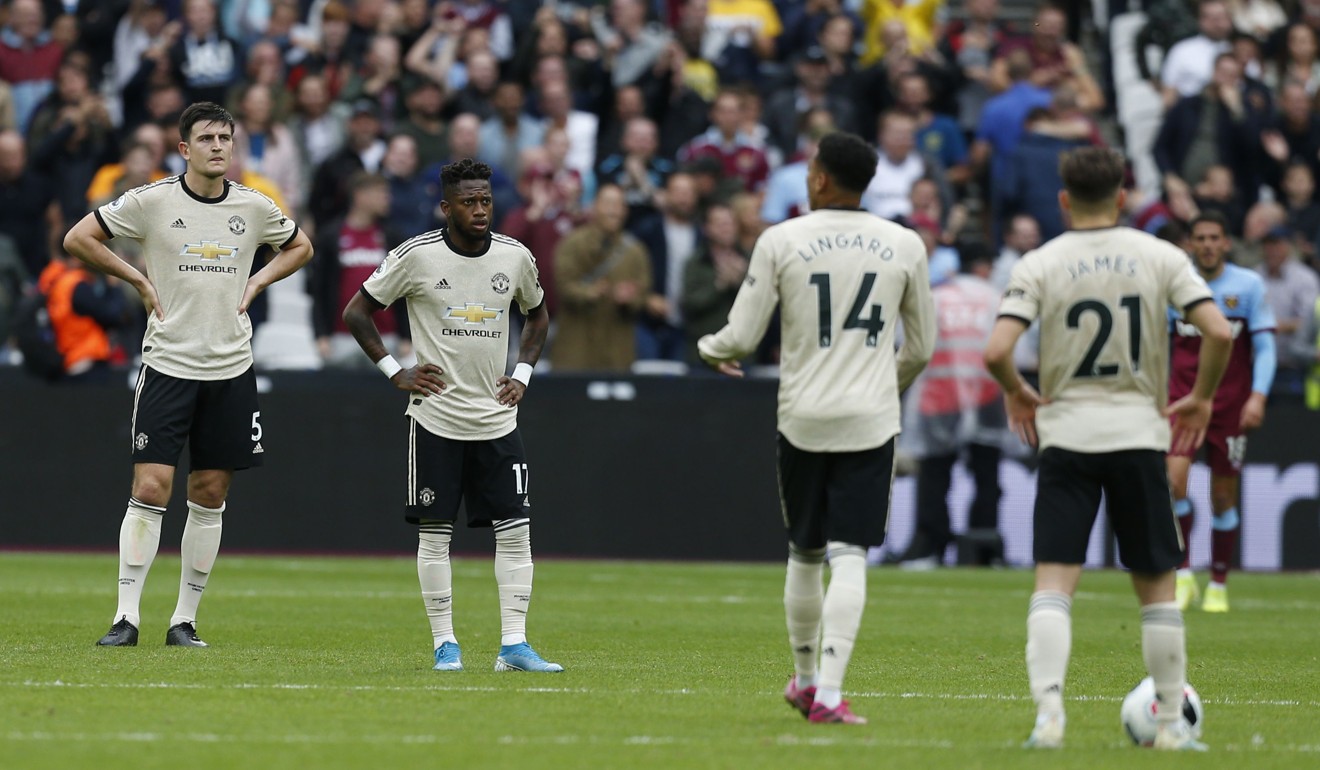
Manchester United must learn lessons of past to fix their future amid worst start in 30 years
- Ole Gunnar Solskjaer’s goal-shy side need to start scoring to turn their fortunes around
- Defence is not the way forward but United may have to shut up shop – for now, at least – with Premier League leaders Liverpool next up
It hasn’t been this bad on the field for 30 years. Manchester United have won two of their seven league games, scoring more than one goal only once. They are 12th in the table, three points off the relegation zone.
The bad run can be stretched further: since beating Southampton at home in March, United have won only four times, drawn four and lost eight. There have been no away wins since March. This is relegation form.
The club are determined to stick with the manager, but while Ole Gunnar Solskjaer is building for the long term, he needs to get results in the short term.
Just how bad was it 30 years ago? United went 12 league games without a win between away wins at Luton in November and at Millwall on February 10.

United slipped to 17th after a February 3, 1990, draw at home to Manchester City. The 40,274 crowd that day was 16,000 short of Old Trafford’s capacity to see a home team who had won only six from 24 games and faced 18th-placed Millwall away in the next game, a relegation six-pointer.
What happened next? United beat Millwall 2-1 with goals from Mark Hughes and Danny Wallace. League form picked up enough for United to rise to 13th, five points above the relegation zone and above Manchester City on goal difference.
Alex Ferguson kept his job not because of the upturn in the still dismal league form, but an FA Cup run leading to his first trophy in England. United finished in sixth place the following season, then second, then won their first of 13 titles in 20 years.
United avoided relegation in 1990, but not in 1974, the only time the team went down since World War II. This was despite having one of the better defences in the First Division, but a goal difference of -10.
Only four times in that worst of seasons did United concede more than two goals – they lost 3-0 to Arsenal in the season’s opener, 3-2 to Newcastle, 3-0 to QPR on New Year’s Day, the game that saw the last United bow of George Best. He was only 26 years old. And United drew 3-3 with Burnley in March.

There were only nine League games in which United scored two or more goals (their highest total three – which they managed in three games, one of them that Burnley draw).
The most damning statistic is that they failed to score any goals in 18 – yes, 18 – league games, scoring 38 and conceding 48. United lost 16 of their 42 league games by a solitary goal.
The top scorers’ list was embarrassing: Sammy McIlroy led with six – and he was still in recovery from a car crash. The severity of the goal drought was showed early on when goalkeeper Alex Stepney’s two penalties made him the club’s highest scorer on October 20. United won a mere 10 games all season; only three of those away from Old Trafford.
United only looked as though they might escape the drop when, supposedly on the urging of Matt Busby, they threw caution to the wind with eight games to go and scored 12 (nearly a third of all their League goals) in three matches and got nine out of 10 points. It wasn’t enough as United finished 21st from 22.
What happened next? Tommy Docherty kept his job and his side – backed by a red army of fans – stormed the second division the following season, a year fondly remembered by many United supporters. They finished third in their first season back in the top flight.
That relegation wasn’t a complete surprise since United finished 18th the previous season. The team which had been champions of Europe in 1968 was in a process of steady decline, allowed to grow old, and it wasn’t pretty.

Busby was no longer manager but he still had a huge say, which subsequent managers resented. The players were not united. The wayward Best didn’t get on with Bobby Charlton, while Charlton didn’t like the managers. There were some awful buys, the youth system all but stopped.
It wasn’t much better a decade earlier. United finished 19th in 1962-63 as the league positions got progressively worse after the 1958 Munich air crash.
United finished second in the first full season after Munich, then 7th, 7th, 15th and 19th. Busby’s teams finished seventh or lower eight times in 25 years when he won five league titles.

Before the war, United weren’t even the biggest club in Manchester. The team didn’t win the title between 1911 and 1952. They spent more of the 1930s in the second division than the first.
My Uncle Charlie dreamed of playing for Herbert Chapman’s Arsenal. Instead he had to settle for Manchester United, where he’d become a post-war star. Before the war, United were relegated twice in the 30s, first in 1931 then in 1937 – as Manchester City won the title.
Last year, I met the son of Bill McKay, the captain of a 1930s United side, who played in one game in 1934 when they needed to beat Millwall in the last game to avoid relegation to the third tier. Hoping for a change in the bad fortune that had dogged them all year, they decided to discard their famous red jerseys and instead wore cherry and white hoops. The plan worked, United won 2–0, but they never wore the strip again.

What happens next for United? History teaches that Solskjaer should try to win games by scoring plenty rather than concentrating on keeping a clean sheet – because it doesn’t appear that the team can do both. Unlike 1973-74, it’s three points for a win – a move introduced to encourage attacking football.
United’s defence is tighter, but as we saw in 1974, the team went down despite conceding fewer goals than in any of the previous six seasons.
That’s not going to be easy in the next game against league leaders and European champions Liverpool, where Solskjaer’s tactic might be to close the game down to avoid an unacceptable thumping.

